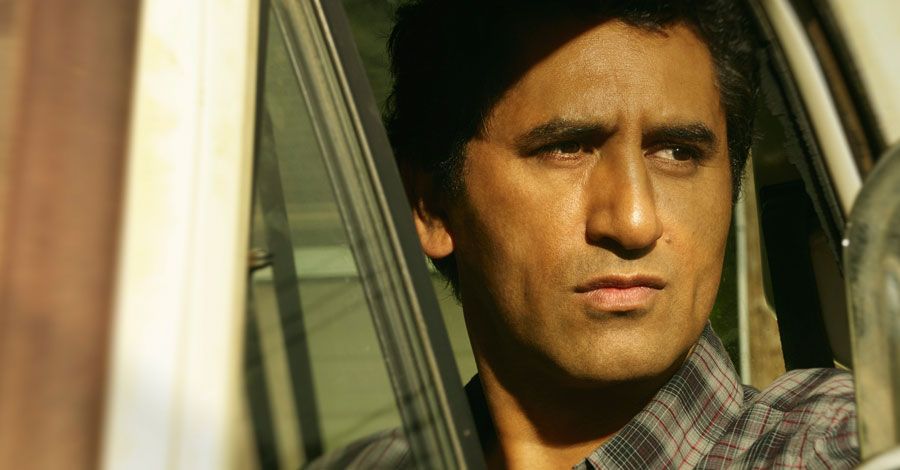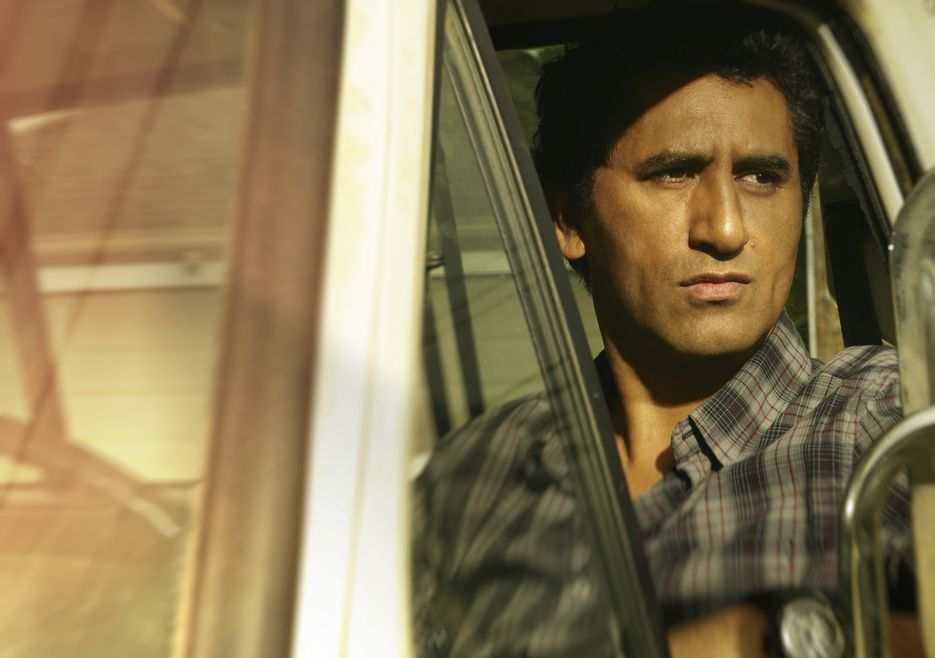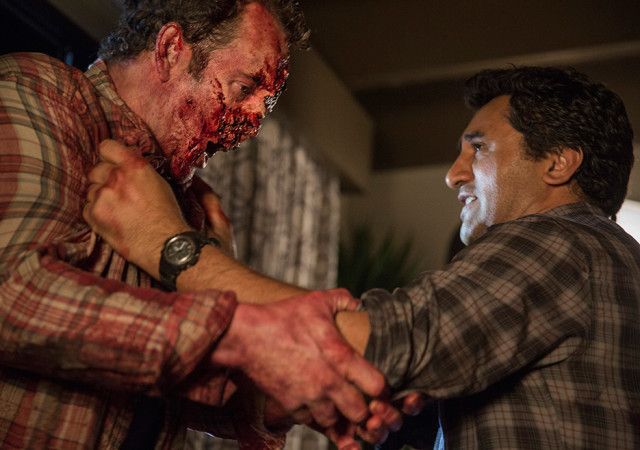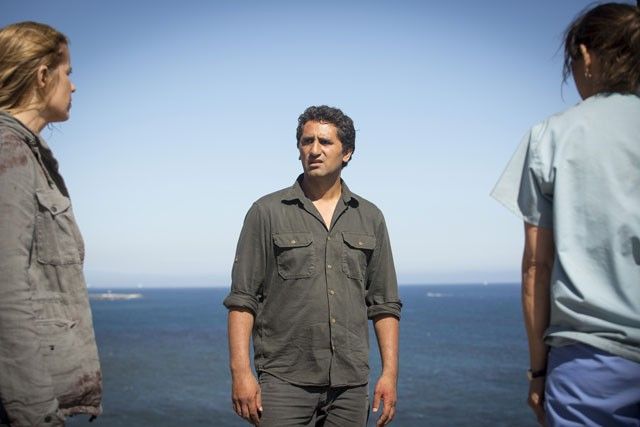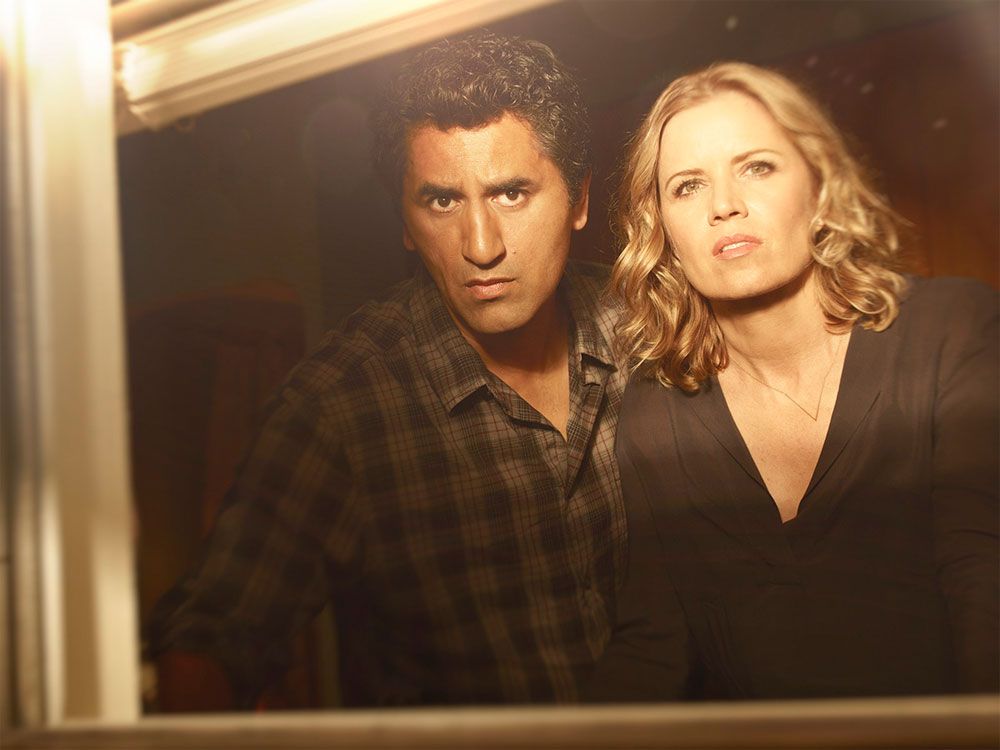Here's the good new for Cliff Curtis: his character, Travis Manawa, survived the first season of "Fear the Walking Dead." The bad news: there are new horrors the character and the actor will endure when the zombie apocalypse gets even more horrific in Season 2.
During an impressively rated freshman season on AMC as the sister series/prequel to the phenomenally popular "The Walking Dead," "Fear" quickly established that not only would it be set in a different place (Los Angeles ) and time (the very beginning of the Walker outbreak) it would have its own atmosphere, pace, tone and character dynamic. A dysfunctional family drama made more intense by the increasing amount of undead threats rising all around them, right at the center was Curtis' Travis, along with his girlfriend Madison Clark (Kim Dickens) as the glue holding their disparate family members and friends together.
AMC Looks Ahead to "Fear the Walking Dead" Season Two in New Video
With the first six-episode season now available on home video, Curtis checked in with CBR News about his experience entering a world soon to be dominated Walkers. He also offered some thoughts on the future, as the Manawa/Clark clan sail into what will most certainly be treacherous waters.
CBR News: What was the most unexpected surprise for you in making these first six episodes?
Cliff Curtis: How committed the team, the network, the writers, directors, everybody was to having a drama and characters that were believable to life and not just badass comic book characters. That really surprised me. I wasn't expecting it. I thought it was going to be a lot more entertainment-driven and more similar to the original show. But no, they stuck to their guns, and I was really pleased with it.f I really enjoyed it.
It really did carve out its own space. Now that you've had a chance to dig into Travis, what are you excited about developing further?
I'd like to see him be a little bit more of a badass and see how he copes with that, if you know what I mean. Just to see him get a little more action, because he's crossed a line by the end of Season 1, and I just don't think he can maintain this idea that the zombies are human. He's probably shifted and changed in his worldview, and it's going to be interesting to see how that plays out. I'm looking forward to that, really.
What can you tell me about the response from the audience as the show started to air? There was a lot of anticipation for it, and it seemed to really live up to expectations in the audience's eyes, I think.
It's a huge risk to take on a franchise that's this successful and is so beloved by so many, and to defy the expectations of what the show should or could or might be. I kind of expected our show to have a kind of a smaller audience by the end of the run. I sort of figured, oh, you know, we're the new, smaller show, and we're much more sort of drama-oriented in a sense and not so much the action-oriented show. We had whole episodes with no zombies in them, which was really surprising, I think, even for some members of the audience, the fan base, that the creators would go that far in terms of pushing that.
It was really gratifying to see that the audiences actually held on -- that people actually hung in there with us. I was like, "Wow!" And the creators of the show were really quite confident that it would work. I was thinking, "Well, the jury's out. Maybe we'll drop ratings, or drop by half and half again." But they dropped about 25 percent, and we competed strongly against very tough shows. The audience stayed with us, and it was really gratifying.
What was your favorite day shooting Season 1, one that you're always going to remember?
Oh, wow. In a lot of ways, the shoot becomes a bit of a blur. The schedule changes so much, and so much happens -- in some ways, I can't even remember a lot of it because we work such long hours. We work so much, and so much changes. It was really great.
It's two sides to this: one side is the show, and the other side is the making of the show. It was just such a pleasure to work with a team -- I know probably people say this about every time they talk about a show in the background, but we just had a really great bunch of people. I loved working with Kim, and meeting the young actors. We just had a great cast and everybody got on so well. There was none of the crazy frenetics, because on juggernaut shows, the kind that gives people a little license, sometimes more extreme stories come out of it. Say, you get these great sort of, "Oh, you won't believe what happened on set today!" In fact, I've been on movies where that happens. It's really quite dramatic, and that's quite fun. But the fun for me was that wasn't happening.
In terms of shooting, I love shooting in L.A., especially East L.A., and it was really fun when we got the military presence in L.A. The whole concept of, if there's a crisis in somewhere like East L.A. -- it just felt really believable when we saw all of the Humvees rolling down the streets, and the spraying, marking on houses, that they're contaminated, and the numbers of those dead or missing. I was like, oh, wow -- that really is when it became really real for me.
I'm going on and on, because there were these two moments on the show that made it feel real to me. One was the big traffic jam, and we didn't see what was going on. The next day, we see it uploaded, what we drove past, and we had just thought it was a traffic jam. That sort of was where the reality of the show and the reality of life start to blur. The other one was the riot in the streets. That felt really real, like, tangibly real. It looked just like you see on the news, when there's a protest, and then a riot. And then, next thing you know, the military's got the suburbs under lockdown.
The first three episodes looked very much like life in East L.A., as it is now. But then, it tipped the scale when the military turned up. That's sort of what you're used to seeing on the news when the U.N. [enters] sort of the developing countries, or war-torn countries -- we don't see that in East L.A., you don't see that in L.A. That was, for me, a seismic shift in the stakes of the show and how real it felt for me, working on the set.
It looks like you're getting on a boat. How are your sea legs?
Love the sea. I love being at sea. Yep. I'm all about it., and I love the potential of the story that's going to come out of that. What's great about it is that it's the next logical thing to do, right? I think it's going to be real exciting. I get the feeling we're not going to be the only ones at sea.
The whole show is saying, "We're heading east. We're heading east. We're heading east. We're going to the desert. We're going to the desert. We're going to the desert." You hold out right for the last moment of the last episode of the first season, and then, there it is: We're heading off into the sea. I think it's very cool.
Does the tone of Season 2 keep with the slow burn or take a shift?
I haven't seen anything, but I've heard it's got a -- we can't go backwards, so we can't go back to who Travis was, the man he was in Season 1. Things have changed -- for my character, especially. He does things that he thought he'd never, ever have to do, and he would never be capable of doing. That's going to have an impact on him. I think they do want to hold onto the style of the show, which is in the vein of the slow burn. I don't know how that works, and I haven't seen anything, but not to the [the slow burn] extent of Season 1. It's going to come up a couple of notches.
Season 1 sort of started really contained; there's a whole lot of people not knowing anything [and it took] its time to ramp up into [episodes] Five and Six. I don't think we should go backwards in terms of the tension in the show. We've got to come on a little differently in Season 2. That's just my opinion, but to be honest, they haven't shown me anything.
What's got you excited about Travis and Madison's relationship for Season 2?
I'm really pleased, because there was a point in the first season where it really looked like we were going to split, that it was not going to work out well for us because we were diametrically opposed in terms of what the right thing was to do in the circumstances. But now that Travis has sort of crossed a line and this threshold has been broken, they can be a lot more aligned in terms of how to deal with situations.
Although, there's going to be tension, I believe those circumstances have pushed us closer together, and I'm looking forward to that because Season 1, it was actually a really tough relationship. We started off all lovey-dovey, and then we grew further and further apart, until right at the end, we get pushed back together again, emotionally, anyway. I'm really looking forward to us working together as a team a lot more, but I don't know what they're going to give us. They might not deny a couple that satisfaction, but that's what I'm looking forward to -- the potential, anyway.
Us, sort of committing to be a family, and this idea of this world, because he's still the idealist and he's still the optimist. It's like, "Okay, everything's gone crazy." This is the distinction between him and Strand: Strand's last line in the show was like, "When it all goes bad, embrace the madness." To me, Travis was like, "What an A-hole. What kind of view of life is that? In times of madness, you need most of all to remain sane. You need to be clear. You need to understand what the value of life is. Don't just go around, randomly chopping people up!" It doesn't make sense to Travis, so I look forward to seeing how Travis and Madison, how we build our family dynamic, and how that works.

